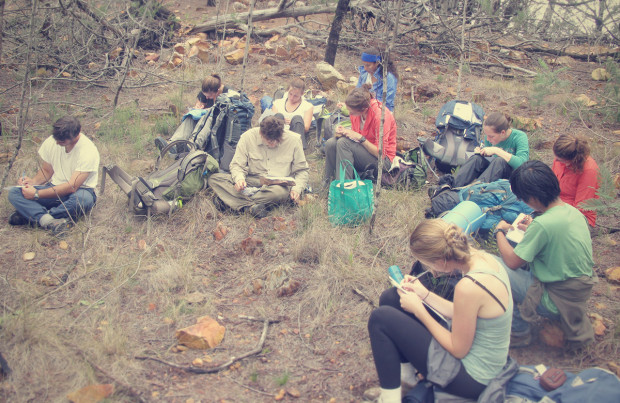The Wildlands Studies –South Africa (WS-SA) course recently came to a close. As lead instructor for the six-week programme, it was an immense learning experience both for the participating U.S students as well as myself and fellow co-instructors. It drives one to further ask the question: how can sustainability education be designed in order to deepen understanding about one’s interactions with the natural environment as well as support growth and learning about oneself?
WS-SA is a field-based teritiary programme primarily based in the Baviaanskloof Mega-Reserve and Great Fish River Reserve. Whilst much information is imparted through lectures and stakeholder visits, the core focus is on experiential learning. It is this element which will be reflected upon for this particular post. (For more details on the Wildlands course and activities see the following EarthCollective articles: ‘Mind the Gap’ and Growing Plants & People ; and the an outline of the course on the Wildlands Studies website.)
Naturally, learning comes through many ways and what this particular course aims to provide unique opportunities for tangible (‘hard’) and intangible (‘soft’) experiential learning. There were plenty of planned hands-on activities where students immersed themselves in the field and learnt practical techniques aimed at biodiversity conservation and wildlife management. But we also tried to create optimal conditions for ‘meaningful experience’ …to facilitate inner learning and growth.
This latter aspect is also central to questions being addressed by the PhD research which forms a basis for eyes4earth.org.
Environmental psychologists speak of three ways in which children can experience ‘nature’: Structured, Spontaneous and Symbolic (adapted from Kahn & Kellert (ed) 2002) but I believe this extends to beyond just children. I feel it is also a framework which can guide education all the way through to adulthood. (As Bill Plotkin speaks about in his writings, there are also various human development stages (which incorpoate both nature and culture) with which we need to pass – and grasp – in order to become fully matured souls).
In WS-SA, there were “structured” activities where students were given guidance on how to ‘open up’ their senses to raise their awareness and submerse themselves in the ‘more-than-human-world’ (after Abram 1996) within which we reside. There were “structured” activities which gauged how students experienced (from a sensory perspective) being surrounded by the alien invasive Black Wattle (without knowing beforehand that this was non-native vegetation). And there were “structured” field site visits whereby students could learn with their own senses the impact of Black Wattle infestations – as well as efforts to clear and restore – on the landscape.
But a number of these visits were notable by the “spontaneous” dimension. I recall our long hike (around TerraPi ) which. whilst aimed at exposing students to ‘the Black Wattle problem’, will always remembered for the remarkable wildlife encounters we experienced during these hours (as well as the fact that we didn’t pack any lunch!). And on those hikes, people choose to spontaneously explore. And animals chose to spontaneously appear. The curiosity of one student in checking under stones and logs meant that we all could appreciate seeing a species of scorpion which we had not seen previously.
And then finally comes the “symbolic”. Symbolism in nature and in events can go close to the heart of how we find meaning in our lives. Symbolism is “shape-shifting” in the sense that it is not necessarily recognisable by some or may mean different things to different people. It may come through stories, through events, through encounters, through dreams or though the perfection or purity of nature. In wilderness, it is often at our fingertips…maybe even hidden – or mirrored! – in plain view.
WS-SA 2010 was, from my point of view, scattered with symbolism. Some was only meaningful to me as I sought to deepen my understanding and clarity for the PhD research questions I am addressing. These chiefly being linked to evidence for meaningful experience, impacts of invasive vegetation on our sensory experiences and the implications for education focusing on (inner and outer) sustainability.
Other participants on the course would have tapped into other symbolism for themselves – in one way or another- which may relate to their current life situation. As a group, we/they witnessed a freaky rock fall (which by grace or good luck was a narrow escape); close-up, adrenalin-filling wildlife encounters; ‘limit’ experiences (the opposite of ‘peak experiences’ after Fengler 2010) in steeling oneself to carry out an animal necropsy; and cultural shocks and revelations in being exposed to past and present history of peoples with different perceptions to one’s own.
One of my own personal favourite moments was of the student who, in a group debate on ‘interspecies communication’, resolutely declared that insects have never been proven to have any kind of sentience and, no sooner had the words come out of the mouth, did a swarm of thousands of bees casually approach the group and innocently and passively fly overhead….though not without first causing a frantic swearing-filled scurry for cover! This was a moment which was symbolic for some and of only passing interest to others…
Whether it was “structured” course activities, “spontaneous” opportunities to engage in hands-on field research or “symbolic” moments linked to anything experienced during the course, students were required to keep a detailed field journal during their six weeks. This may possibly have been one of the most valuable learning aids for the entire course. A journal becomes an active listener in absorbing ones thoughts, introspections and tracking one’s learning and changes in perception during what is otherwise an extremely intense period (physically, mentally, emotionally and spiritually). As instructors/assessors, we are incredibly grateful for the opportunity to review the journals and intimately share student learning moments… in order to enhance our own understanding of what exactly it takes to design effective and holistic conservation education programmes.








Be the first to share a comment